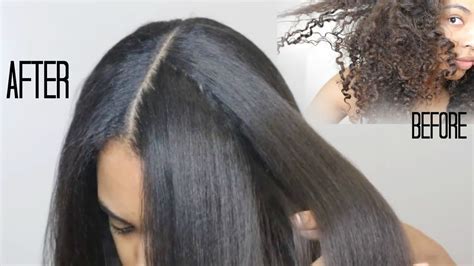What is a Curly Hair Relaxer?
A curly hair relaxer is a chemical treatment applied to hair to reduce or eliminate its natural curl pattern. It works by breaking down the hair’s disulfide bonds, which are responsible for its shape and texture. Relaxers can be permanent or semi-permanent, and they come in various strengths, allowing for different levels of curl reduction.

Benefits of Curly Hair Relaxers
- Reduced tangling: Relaxed hair is less prone to tangling, making it easier to comb and style.
- Increased versatility: Relaxed hair can be styled in a wider range of ways, including straightening, curling, and braiding.
- Heat damage protection: Relaxing hair helps protect it from heat damage caused by styling tools like hair dryers and flat irons.
- Reduced frizz: Relaxing hair can help reduce frizz, especially in humid environments.
Considerations of Curly Hair Relaxers
- Chemical damage: Relaxers contain chemicals that can damage hair if not used properly. It is crucial to follow the instructions for use and consult with a professional stylist before using a relaxer.
- Hair breakage: Relaxing hair can weaken it and lead to breakage, especially if it is already damaged.
- Scalp irritation: Relaxers can cause scalp irritation, including burning, itching, and redness. It is important to protect the scalp during application.
- Expense: Relaxers can be expensive and require regular touch-ups to maintain the desired results.
Types of Curly Hair Relaxers
1. Sodium Hydroxide Relaxers
- Also known as “lye relaxers,” these are the most common type of relaxer.
- They contain sodium hydroxide, which is highly alkaline and can cause severe damage if not applied correctly.
- They provide the most immediate results, but they are also the most damaging.
2. Guanidine Hydroxide Relaxers
- Less common than sodium hydroxide relaxers, these contain guanidine hydroxide.
- They are milder and less damaging than lye relaxers but may not provide as dramatic results.
3. Calcium Hydroxide Relaxers
- Also known as “no-lye relaxers,” these are the least damaging type of relaxer.
- They contain calcium hydroxide, which is less alkaline than sodium hydroxide.
- They provide more gradual results and can be used more frequently than other types of relaxers.
How to Choose the Right Relaxer
The type of relaxer that is right for you depends on your hair type, texture, and desired results. It is important to consult with a professional stylist who can assess your hair and recommend the best relaxer to meet your specific needs.
Step-by-Step Guide to Applying a Curly Hair Relaxer
It is crucial to follow the specific instructions for use that come with the relaxer. General steps include:
- Test a small area of hair to check for allergic reactions.
- Protect the scalp with a barrier cream or petroleum jelly.
- Apply the relaxer evenly to the hair, avoiding the scalp.
- Leave the relaxer on for the recommended time.
- Rinse the hair thoroughly and neutralize the relaxer according to instructions.
- Condition the hair to restore moisture and protect against damage.
Maintenance of Relaxed Hair
- Regular touch-ups: Relaxed hair requires regular touch-ups to maintain the desired results. The frequency of touch-ups varies depending on the type of relaxer used and the growth rate of the hair.
- Deep conditioning: Relaxed hair benefits from regular deep conditioning treatments to restore moisture and prevent breakage.
- Protective styling: Wearing protective hairstyles, such as braids or buns, can help protect relaxed hair from damage during sleep or other activities.
- Avoid heat styling: Heat styling can damage relaxed hair. Limit the use of heat tools and use them at the lowest possible temperature.
DIY Curly Hair Relaxer
It is not recommended to attempt a curly hair relaxer at home. Relaxers contain dangerous chemicals that can cause severe damage to hair and scalp if not used correctly. Always seek the assistance of a professional stylist for any chemical hair treatment.
Curly Hair Relaxer Alternatives
If you are looking for an alternative to chemical hair relaxers, there are several natural options available:
- Natural hair masks containing ingredients like coconut oil, avocado, or shea butter can help soften and detangle hair.
- Keratin treatments can temporarily smooth and straighten hair without using harsh chemicals.
- Silk presses use a combination of heat and pressure to create a sleek, straightened look.
Conclusion
Curly hair relaxers can offer benefits such as reduced tangling, increased versatility, and heat damage protection. However, it is crucial to understand the chemicals involved, the potential risks, and the proper use and maintenance of relaxed hair. By consulting with a professional stylist and following the instructions for use carefully, you can minimize damage and achieve the desired results.
